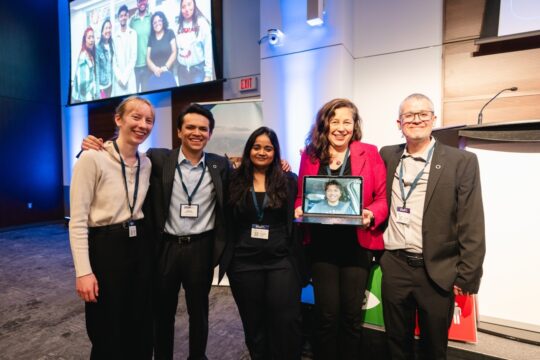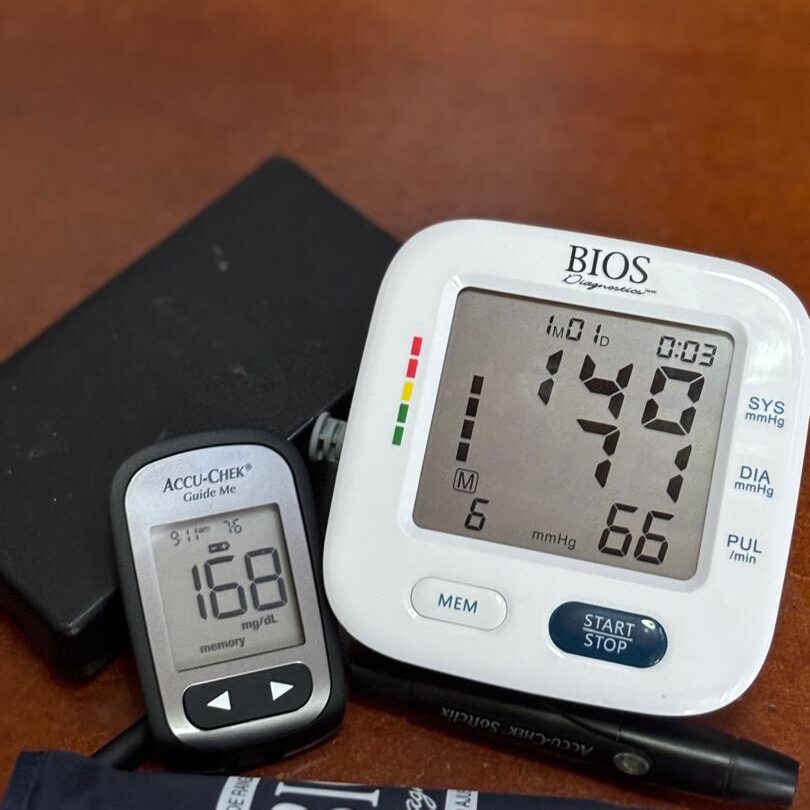Executive Summary
Ghana, like many low- and middle-income countries, is grappling with a silent but accelerating health crisis: the rise of noncommunicable diseases (NCDs), particularly hypertension and type-2 diabetes. These two conditions, closely linked by shared risk factors such as poor nutrition, physical inactivity, and aging, often go undiagnosed until complications emerge, contributing to preventable deaths, especially in under- resourced and underserved communities.
Although preventable and manageable, hypertension and diabetes remain poorly addressed in many parts of the country. Traditional healthcare systems are stretched thin, and the promise of digital health remains unevenly realized. Although mobile apps, wearables, portable diagnostics, and remote monitoring tools are revolutionizing chronic disease management globally, in Ghana, these innovations are often confined to urban or private settings, leaving rural and hard-to-reach communities behind. We investigate how technology is currently being used to manage type-2 diabetes and hypertension in Ghana and, crucially, who is being left out. Drawing on a mixed-methods approach that includes interviews, surveys, and desk research, our study explores levels of awareness, accessibility, and actual use of digital health tools in under-resourced communities.
The findings offer a compelling insight: digital health can transform chronic disease care, but only if tools are designed to be inclusive, context-aware, and simple enough to meet people where they are. Equitable deployment of these innovations is not just a technological challenge; it is a public health imperative.
Figure 1. A diabetes and hypertension patient showing some medicines he just receivedGlobal Context: The Rising Prevalence of non-communicable diseases
Noncommunicable diseases (NCDs) have quietly become the world’s biggest killers, representing a major and growing threat to public health systems. In 2021 alone, NCDs were responsible for over 43 million deaths: three-quarters of all non-pandemic-related deaths worldwide. Among these, 18 million were considered premature, affecting people under the age of 70. The burden falls heavily on low- and middle-income countries (LMICs), where 82 per cent of such premature deaths occur. In many of these settings, access to timely care and long- term disease management is often limited.1
Ghana is no exception to this global trend. In the 1990s, NCDs accounted for just 27.8 per cent of all deaths in the country while infectious diseases were responsible for a much higher 67.4 per cent of all deaths.2 Today, NCDs account for an estimated 43 per cent of deaths2 in the country, with hypertension (HT) and type-2 diabetes (T2D) emerging as two of the most pressing concerns.3 These two connected conditions share multiple risk factors such as poor diets, physical inactivity, obesity, and aging. They also tend to occur together, each being a risk factor for the other, creating a dangerous cycle of comorbidity that significantly increases the risk of severe complications.
The economic impact of NCDs on Ghanaian households is substantial. Studies indicate that families affected by both hypertension and type-2 diabetes can spend up to 94 per cent of their healthcare- related costs on disease management alone, with lower socioeconomic groups bearing a disproportionately heavier burden than those with higher incomes.4 Such high health expenditures push families deeper into poverty when economic constraints further limit access to care.
To complicate matters, Ghana’s current healthcare delivery model remains largely oriented toward acute care and infectious disease management, with limited support for NCDs and other chronic conditions. Many health facilities lack standardized protocols for NCD care, and the implementation of the WHO Package of Essential Noncommunicable Disease Interventions (WHO-PEN) for primary healthcare has been minimal across the country. Although the Ghana Health Service has outlined a policy for increasing the adoption of digital health, it remains a challenge because there is limited infrastructure to support digital health solutions, and there is also a low uptake of such solutions. While HT and T2DM are largely preventable and manageable through lifestyle modifications, medication adherence, and regular monitoring, they are frequently diagnosed late or improperly managed, especially in resource- constrained settings. This delayed or inadequate care significantly increases the risk of developing life-threatening complications, creating a vicious cycle where preventable conditions become major causes of morbidity and mortality.
Our Study: Technology’s Potential in Healthcare Technology offers a promising pathway for transforming healthcare delivery and addressing many of the systemic challenges facing Ghana’s health system. Tools such as portable diagnostic devices, mobile health applications, electronic health records, and remote patient-monitoring platforms have revolutionized how patients manage their conditions and how healthcare providers deliver care. These tools support earlier diagnosis, improved treatment adherence, and ongoing disease monitoring, while easing pressure on overburdened health systems.
Given the growing burden of NCDs in Ghana, exploring how technology is — or isn’t — being adopted to manage hypertension (HT) and type-2 diabetes (T2DM) is both timely and critical. Understanding this intersection could uncover opportunities to scale life- saving interventions and ultimately reduce preventable deaths. However, the adoption and integration of such technology for the management of HT and T2DM in the country remains limited and uneven. While some urban areas and private healthcare facilities have begun implementing electronic health records and basic mobile health interventions, the majority of the population, particularly those in rural and underserved communities, have limited exposure or access to these innovations. Existing digital health initiatives often remain small-scale pilot projects that struggle to achieve sustainability and integration with the broader healthcare system.
We therefore sought to understand how technology is currently being used to support the long-term management of hypertension and type-2 diabetes in Ghana, and to identify gaps, challenges, and opportunities for more effective digital health interventions. In this study, we focus on Ghana’s hard-to-reach communities, which face unique and compounded barriers to being aware of, accessing, and using health technology for the management of HT and T2DM.
Why is this population hard to reach
The Hard-to-Reach
For our purposes here, we define “hard-to- reach” communities using a multidimensional lens. The Ghana Statistical Service (GSS) defines multidimensional poverty as the “many overlapping deprivations that people living in poverty experience,” using 12 non-monetary indicators across three dimensions: education, health, and living standards.5 Building on this framework, we define “hard to reach” as encompassing individuals and communities who are not only multidimensionally poor, but who also face additional structural or spatial barriers such as geographic isolation and poor mobile and internet connectivity. These compounding barriers reduce access to both traditional health services and emerging health technologies and make them a critical focus for any efforts aimed at equitable health improvement.
Health Technology’s Barriers and Opportunities
We thus seek to investigate the landscape of health technology use for HT and T2DM management in Ghana, with a particular focus on understanding the barriers and opportunities that exist within hard-to- reach communities. In doing so, we aim to contribute to a more inclusive, data-informed, and equity-driven response to Ghana’s growing NCD burden, supporting national goals for universal health coverage while advancing global efforts toward achieving UN Sustainability Goals 3 (Good Health and Well-being), 9 (Industry, Innovation, and Infrastructure), and 10 (Reduced Inequalities).
Research Approach
We used a mixed-methods approach for both quantitative and qualitative insights. The research design was specifically chosen to capture the different experiences related to hypertension and type-2 diabetes management, and to enrich statistical patterns with the lived experiences of individuals navigating these conditions, as well as healthcare professionals’ perspectives.
Study Settings and Site Selection
The research was conducted across four regions of Ghana: Greater Accra, Western, Central, and Ashanti regions, with fieldwork taking place in the suburbs of Accra, Takoradi, Cape Coast, and Kumasi. We selected these regions because our research highlighted them as having the highest prevalence of hypertension and type-2 diabetes nationwide.6 Within each region, we focused on areas that aligned with our definition of hard to reach, prioritizing peri-urban areas (i.e., the “outskirts” or areas surrounding cities) and smaller market communities. This approach allowed us to capture and appreciate different geographic, socioeconomic, and cultural contexts, while centring the experiences of populations most likely to be underserved.
Table 1. Key to healthcare-respondent codes, interview locations, and roles
Participant code Location Current role in Ghanaian healthcare system R1 Accra Administrative staff at the Ghana Medical Association and medical practitioner R2 & R3 Accra Medical doctor in a tertiary hospital R4 Accra Principal nursing officer in a teaching hospital R5 to R8 Takoradi Principal nursing officer in a teaching hospital R9 to R11 Cape Coast Principal nursing officer in a teaching hospital R12 Cape Coast Emergency medical officer in a teaching hospital R13 & R14 Cape Coast Nursing official in a teaching hospital R15 & R16 Cape Coast Administrative staff in a tertiary hospital
Table 2. Key to patient-respondent codes with diabetes or hypertension
Participant code Location Condition P1 to P3 Dome Market, Accra Diabetes P4 to P6 Dome Market, Accra Hypertension P7 & P8 Dome Market, Accra Both diabetes & hypertension P9 to P11 Sekondi Market, Takoradi Diabetes P12 to P14 Sekondi Market, Takoradi Hypertension P15 & P16 Sekondi Market, Takoradi Both diabetes & hypertension P17 to P19 Cape Coast Diabetes P20 to P22 Cape Coast Hypertension P23 & P24 Cape Coast Both diabetes & hypertension P25 to P27 Kumasi Diabetes P28 to P30 Kumasi Hypertension P31 & P32 Kumasi Both diabetes & hypertension
Qualitative Data Collection and Analysis To move beyond the numbers and statistics, we turned to semi-structured, in-depth interviews to fully understand the realities of people’s experiences within the communities. Over several weeks, our research team visited different study sites: the Dome Market in Accra, the Sekondi Market in Takoradi, then to community clinics in Cape Coast, and finally to Kumasi’s neighbourhood health posts and surrounding communities. At each location, we invited both patients living with hypertension and/or diabetes, caretakers of such patients (who acted as proxies), and healthcare professionals to share their perspectives on awareness of, access to, and use of digital health technology for managing HT and T2DM.
Sampling strategy. We used purposive sampling to identify individuals whose experiences could provide deep insights into the challenges and opportunities connected to digital health technologies for NCD management. This was complemented by convenience sampling when impromptu opportunities arose, such as when market vendors paused between serving their customers.
Interview process : In total, we conducted between 10 and 15 interviews at each site (48 interviews total), allowing conversations to unfold naturally in participants’ preferred languages, primarily Twi and Fante. We obtained consent from participants, and the interviews were recorded and labelled by a number, the location, and type of person interviewed (i.e., patient with diabetes, patient with hypertension, dual-diagnosis patient, healthcare professional). Interviews were semi-structured, covering topics including: barriers to accessing healthcare and technology, and current diabetes and hypertension management practices, awareness and experience with health technology, and preferences for future digital health interventions.
Guided by Braun and Clarke’s six-step framework, we began work on the qualitative strand by immersing ourselves in field notes and interview transcripts.7 The interview transcripts were generated manually because most of the interviews were conducted in the local dialects (Twi and Fante). Transcription was completed in Microsoft Word, followed by open coding without preconceived labels: codes were iteratively refined and compiled into a comprehensive codebook. During theme development, codes reflecting mentions of knowledge or lack of knowledge regarding devices (e.g., glucometers, blood pressure monitors) were grouped under “awareness of technology,” while remarks about the cost or financial barriers formed the “cost and affordability” theme. Themes such as “cultural and belief barriers” and “healthcare system’s role” emerged similarly, capturing local belief systems and institutional influences.
Figure 2. Team member Hilary interviewing a patient during a health-screening programTo further ground our analysis, we applied the Unified Theory of Acceptance and Use of Technology (UTAUT) as a guiding framework for interpreting emerging themes related to the adoption and use of digital health tools. Developed by Venkatesh and coauthors, UTAUT synthesizes multiple models of technology acceptance and identifies four key determinants of user behaviour:
performance expectancy (belief that the technology will help),
effort expectancy (ease of use),
social influence (the degree to which others encourage its use), and
facilitating conditions (availability of resources and infrastructure).8
Table 3. Key to patient-respondent codes with diabetes or hypertension
Thematic phase Purpose Field application Familiarization Immerse in data to understand depth and breadth of content Each transcript was read three times by at least two team members who noted key phrases and their first impressions. Generating initial codes Identify meaningful features across the entire data set Passages related to technology, cost, or cultural beliefs were highlighted in the margins of printed transcripts. Searching for themes Collate codes into broader patterns Related codes, such as mentions of device cost or concerns about complexity, were grouped under provisional themes “affordability” and “ease of use.” Reviewing themes Ensure themes accurately reflect the data We held weekly coding workshops to compare examples under each theme and to refine boundaries or merge overlapping themes. Defining and naming themes Articulate the essence of each theme Clear definitions (for example, “cultural resistance” or “information channels”) were drafted and vetted by the whole team. Producing the report Weave themes into a coherent narrative Themes were interwoven into participant stories, ensuring that each quotation retained its original context and emotion.
UTAUT helped us interpret both the enabling and constraining factors influencing digital health engagement in hard-to-reach Ghanaian communities. For example, participants’ perceptions of whether glucometers or mobile apps would actually improve health outcomes reflected performance expectancy, while concerns about cost, electricity, access, or smartphone literacy aligned with facilitating conditions. Mentions of support (or discouragement) from family, peers, or healthcare workers were read through the lens of social influence, and usability concerns (especially among older adults) spoke directly to effort expectancy. Rather than applying UTAUT rigidly, we used it flexibly to structure our interpretation of qualitative insights, ensuring that emergent themes remained grounded in participants’ lived realities while being mapped onto a broader, widely recognized framework for technology adoption.
Theme Code Supporting quote UTAUT construct Enhancing technological awareness AWARE_TECH P18: “I had never heard of such a device before, only the clinic ever checked my sugar for me.” Performance expectancy & facilitating conditions Addressing financial accessibility COST_BARRIER P2 & P6: “It’s expensive; I’d rather spend my money on food for the family than on batteries and strips.” Facilitating conditions Building competence through hands-on training TRAINING_NEED P21: “I held the glucometer in my hand but didn’t dare press any buttons — what if I break it?” Effort expectancy Integrating cultural contexts into care CULTURAL_BARRIER P32 & R9: “Some say the more you check your blood, the more you invite sickness into your body.” Social influence Institutionalizing patient education in routine practice HEALTH_SYS_ROLE R10: “When nurses take five minutes to show you how it works, you feel confident, but it hardly ever happens.” Facilitating conditions Leveraging community networks for knowledge dissemination INFO_SOURCE P13: “I heard about the monitor from my neighbour. If she hadn’t told me, I’d never have known it exists.” Social influence
Table 4. Themes, codes, and supporting quotes from interviewsQuantitative Data Collection and Analysis We also designed a structured survey to gather broader insights into the levels of awareness, access to, and use of health technologies for the management of hypertension and type-2 diabetes. The survey was administered both in person and online, with the use of Microsoft forms across our selected study sites. It focused on patients, patient proxies (e.g., family members directly involved in the care of patients), and healthcare professionals. Generally, respondents were first asked about their demographic background, including age, gender, education, income, and their relationship to the person living with hypertension or type-2 diabetes (for proxy respondents). In total, we received 392 valid survey responses, with 349 for patients and proxies and 43 for healthcare professionals. This met the required sample size, according to the Krejcie and Morgan table.9 We categorized the responses into two categories: healthcare professionals and patients. This allowed us to compare technology and their perspectives across those providing care and those receiving it.
Sociodemographic characteristics Total (%) Age 18–24 8 (2.3%) 25–34 5 (1.4%) 35–44 68 (19.5%) 45–54 111 (31.8%) 55+ 157 (45.0%) Gender Male 120 (34.4%) Female 227 (65.0%) Prefer not to say 2 (0.6%) Education No formal education 83 (23.8%) Primary school level 60 (17.2%) Junior high (BECE) level 60 (17.2%) Senior high (WASSCE) level 98 (28.1%) Undergraduate 37 (10.6%) Master’s 11 (3.2%) Monthly income 10GHS 0–500 (USD 0–49) 94 (26.9%) GHS 501–800 (USD 49–78) 61 (17.5%) GHS 801–1,200 (USD 79–118) 91 (26.1%) GHS 1,201–3,000 (USD 118–294) 76 (21.8%) GHS 3,000+ (USD 295+) 27 (7.7%)
Table 5. Sociodemographic characteristics of the study sampleOur analysis of the collected data began with descriptive statistics to summarize demographic data and highlight common trends in technology use and accessibility. For the patient surveys, we considered four main socio-demographic factors: age, gender, education, and income. To further explore associations between our key variables, we used chi-squared tests of independence. These tests helped us examine, for instance, whether awareness of digital health tools varied significantly by education level, or whether income influenced technology ownership. We also tested variables such as gender, age group, and involvement in managing a chronic condition to identify statistically significant relationships.
Variable 1 Variable 2 x 2 p-value df Education Awareness 21.967 0.0379 12 Income Ownership 12.443 0.0143 4 Education Ownership 26.488 0.0002 6 Education Interest in learning more 30.268 0.0025 12 Income Ease of access 44.465 0.0002 16 Gender Ownership 8.363 0.0391 3 Gender Use 0.809 0.6673 2 Age Ownership 2.619 0.6235 4 Age Use 2.027 0.7308 4 Awareness Use 1.477 0.2243 1 Ownership Use 0.000 1.0000 0
Table 6. Chi-square tests of demographic and usage variables for self-monitoring technologiesAmong the variables we examined, several demonstrated robust, statistically significant associations with technology ownership, interest, and perceived ease of access (see Table 6). Respondents with more years of formal schooling were much more likely to own a home monitoring device and to express interest in learning how to use it. Similarly, participants in higher income brackets consistently reported that obtaining a glucometer or blood-pressure monitor was easier for them. We also found a modest gender difference in device ownership, with men slightly more likely than women to possess these tools. Taken together, these results indicate that education and financial means, and to a lesser degree gender, are the strongest predictors of both interest in and ownership of self-monitoring technology.
By contrast, age group, experience helping others manage their condition, and general awareness of the devices did not significantly affect ownership or use once education and income were taken into account. These findings suggest that neither life stage nor informal caregiving experience alone drives technology uptake. Instead, an individual’s level of education and their economic capacity determine whether they move from mere awareness to actual acquisition and use of these health tools.
Key Findings on Awareness, Access, and Use of Digital Health Tools
After our analysis, we synthesized both our quantitative and qualitative findings to discover emerging insights related to our four core research objectives: (1) assessing awareness of technologies used for managing for type-2 diabetes and hypertension, (2) cataloguing current usage and accessibility, (3) identifying enabling and inhibiting factors for adoption, and (4) determining effective integration strategies.
Figure 3. Team member Nana Akua interacting with a nurse during data collectionAwareness of Existing Technology
Qualitative perspective. Across all four urban centres, Accra, Kumasi, Cape Coast, and Sekondi, interviewees overwhelmingly reported little to no prior exposure to self- monitoring devices such as glucometers and blood pressure cuffs. One interviewee (P22) said, “I had never heard of any” (aware_tech), underscoring a foundational gap in even basic knowledge. P4 described clinic-bound framing, noting that “you only see these things in hospitals,” which reinforces the idea that monitoring is exclusively a professional, not personal, activity. These narratives suggest that before any intervention can induce meaningful behaviour change, a concerted education effort must first establish what these technologies are, why they matter, and how they can empower individuals to manage their own health.
Quantitative findings. Our survey data indicate that 89.7 per cent of respondents could name at least one self-monitoring technology when prompted with a brief description. However, when asked unprompted whether they had ever heard of a glucometer or home blood pressure monitor, only 34.2 per cent answered affirmatively. This discrepancy between prompted recall and spontaneous awareness highlights superficial familiarity without substantive understanding. We also tested whether simply having heard of self-monitoring tools relates to using them. When we compared answers to “Have you heard of any technology that helps manage your condition?” with answers to “Have you ever used any of these technologies to help others?” as Table 6 indicated, we found no significant link (x ² (1) = 1.48, p = 0.2243). In other words, simply hearing about glucometers or blood-pressure monitors did not make people more likely to have tried them. This tells us that awareness efforts must go beyond talking about these tools and include hands- on demonstrations if we want people to move from passive recognition to giving them a try.
Accessibility of Technology
Qualitative perspectives. Even among the minority who had heard of home monitoring devices, few knew where to purchase them. Respondents frequently remarked, “We don’t even see them around, usually only in the clinics,” underscoring a physical and logistical barrier to acquisition (access_tech). In markets such as Dome and Sekondi, people identified pharmacies as the primary points of service, yet our interviewees reported that these outlets often charge “prohibitive” mark-ups. The uneven distribution of medical technology across community settings therefore compounds the awareness deficit, leaving potential users unable to act even if they wish to.
Quantitative findings. According to the survey, only 26.1 per cent of households reported owning a glucometer or blood pressure monitor. Among those who did not own a device, 68.4 per cent cited “don’t know where to buy” as the main reason, while 54.9 per cent pointed to “too expensive.” People with more years of formal schooling were much more likely to own a home monitoring device and those in higher income brackets were more likely to say it was easy to obtain one. We also found that men were slightly more likely than women to have these tools in their homes. This suggests that efforts to distribute and finance self-monitoring tools should pay special attention to people with less schooling and lower earnings — and women — to close these gaps.
Figure 4. Cape Coast community clinicAdoption Enablers and Barriers
Qualitative perspectives. When prompted on their willingness to adopt self-monitoring, participants expressed a mixture of curiosity and apathy. Some voiced eagerness, “I’m willing to learn so I can use it,” while others defaulted to existing habits, noting that they were “accustomed to going to the pharmacy” for checks and felt no compelling incentive to purchase personal devices (adopt_use). This ambivalence reveals that, beyond awareness and access, entrenched routines and perceived convenience of professional settings continue to dissuade household adoption.
The key thematic barriers are as follows:
Cost and Affordability –
Training and Ease of Use –
Cultural and Belief Barriers –
Healthcare System’s Role
Quantitative findings. Survey data reveal that 61.3 per cent of respondents earn ≤ GHC1,200 (equivalent to about USD 117) per month, a bracket in which the combined cost of a glucometer, test strips, and batteries represents a sizeable share of disposable income. Participants who reported higher answers to “What is your level of education” were also much more likely to answer Yes to “Would you be interested in learning more about these technologies?” By contrast, when asked about actual device use, neither gender nor age made a difference, with both showing no significant effect. These results suggest that while formal education strongly predicts curiosity and willingness to engage, factors such as cultural attitudes, personal confidence, and hands-on training are what ultimately influence whether people move from interest to actual use.
Recommendations to Improve Tech Use .
Qualitative perspectives. Few participants described established self-monitoring habits; instead, many reported episodic or clinic-bound practices: “I’ve been given a chart, so I go to the pharmacy to check my blood pressure,” and “They check it only in the mornings” (routine_ integration). Embedding technology use into daily life requires more than device distribution; it calls for behavioural reinforcement strategies — such as SMS reminders and once-weekly community check-ins — that convert sporadic use into habitual routines. Finally, participants suggested actionable strategies to bridge existing gaps. Proposals included using “radios, and community and market leaders to spread awareness” and “making it affordable would help” (improve_tech_use).
These grassroots suggestions align closely with broader best practices in global health promotion: tailored messaging through trusted community figures, coupled with financial interventions like voucher schemes or micro-financing for device purchase. Collectively, these insights chart a path toward interventions that are culturally resonant, economically feasible, and systemically supported. Participants depended on informal networks and mass media for health information: “My friend owns one and advised that I buy one,” and suggestions like “Maybe through sharing the word about it on radio or TV stations” point to the centrality of peer and broadcast channels in shaping perceptions (info_source). Harnessing these channels — through market leader endorsements, radio spots in Twi and Fante, and testimonial vignettes — could amplify awareness efforts far beyond clinic walls.
Additional Themes
Trust in health institutions. Interviewees repeatedly contrasted personal use with clinic-based measurement, expressing deference to professionals. Trust emerges as a double-edged sword: it can discourage self-monitoring but also, if leveraged, can accelerate acceptance when providers actively endorse and demonstrate devices.
Cultural resonance. Cultural narratives around illness and spiritual beliefs must be navigated sensitively. Collaborating with faith leaders who endorse self-care as responsible stewardship can reframe monitoring practices as culturally consonant rather than taboo.
Economic viability. In these regions, cost remains the most salient barrier. Proposed financial models include voucher schemes, micro-credit for device purchase, and tiered pricing. Any scale-up plan must integrate robust cost–benefit messaging to show long-term savings from avoiding health complications. Four Areas to Strengthen Self-Monitoring. Our mixed-methods findings converge to highlight four critical areas for strengthening self-monitoring of hypertension and type-2 diabetes in Ghana’s hard-to-reach communities: building genuine awareness, improving affordability and access, fostering user confidence, and embedding technology into daily life. Grounded in both local voices and survey evidence, our discussion reframes each area in light of the country’s broader diabetes and hypertension burden and health-technology landscape.
Enhancing Technological Awareness. In a setting where HT and T2DM now account for 43 per cent of national deaths, yet most people “have never seen [a glucometer] outside the clinic,” basic awareness is the first hurdle. Our interviews in market hubs such as Dome and Sekondi revealed that hearing about a device once does little to change behaviour. Table 6 shows that mere recognition (“Have you heard of any technology…?”) bears no link to actual use, underscoring the superficiality of prompt-based familiarity. To move beyond this, awareness campaigns must meet people where they live and trade — market durbars (lively community events held in a marketplace), church gatherings, and local radio dramas in Twi and Fante can plant durable mental anchors. Real-time demonstrations and testimonies from trusted peers will transform devices from abstract concepts into tangible solutions.
Addressing Financial Accessibility . Even when awareness exists, price remains an obstacle. Households facing catastrophic expenditures — spending up to 94 per cent of their health budget on NCD care — cannot absorb high device costs or recurring strip and battery purchases. Our survey confirm that education and income strongly predict both ownership and perceived ease of access. Voucher schemes, micro-financing partnerships with NGOs, and tiered pricing models co- designed with community health centres can lighten this burden and enable families to plan realistically for maintaining a device over time.
Building Competence Through Hands-on Training . In interviews we repeatedly heard about lack of confidence in operating a glucometer or cuff: “I held the glucometer but didn’t dare press any buttons.” This fear cuts across age, gender, and caregiving roles, none of which predict usage in our chi-square tests. In other words, it’s technical skill, not demographics, that limits adoption. Integrating “device days” into existing outreach, with bilingual printed guides and on-site coaching by community health workers, would transform an intimidating tool into an empowering ally. Embedding short tutorials in routine clinic interactions will also normalize self-checks and reinforce competence over time. Integrating Cultural Contexts into Care. Cultural and religious beliefs both hinder and enable self-monitoring. Ghanaian type- 2 diabetes patients often rely on “religious capital,” that is, prayer, spiritual support, and church participation to cope with illness and self-care.11 While some pastors warn that frequent checks “invite illness,” others frame self-care as stewardship of one’s body, a message that resonates with spiritual values. Collaborating with faith leaders to co-create sermon inserts and workshop modules can reframe self-monitoring as an act of responsible care. Similarly, leveraging informal networks — market leaders, neighbours, and radio personalities — would amplify authentic voices and overcome people’s distrust of clinical authority.
Institutionalizing Patient Education in Routine Practice . Our interviewees’ narratives praise nurses who take extra time to demonstrate device use but lament that such moments are rare. To scale this goodwill, every primary-care nurse should be equipped with a portable demonstration kit and brief scripts to guide five-minute tutorials during each patient visit. Standardizing these “nurse-led monitoring modules” within Ghana’s WHO-PEN rollout can ensure that education is woven into the fabric of chronic- care protocols rather than delivered ad hoc.
Leveraging Community Networks for Knowledge Dissemination . Finally, embedding self-monitoring into daily life requires sustained reinforcement through channels people already trust. A multi-pronged campaign — peer ambassadors in women’s groups, story-driven radio vignettes, and short video clips in clinic waiting areas — can keep the conversation alive between visits. By centering participant voices in each message, we honour the authentic experiences that our qualitative work unearthed and ensure interventions resonate with real hopes, fears, and routines.
Study Limitations Sampling Scope and Generalizability . Our reliance on purposive and convenience sampling in peri-urban market communities allowed us to engage deeply with “hard- to-reach” urban populations — those who often fall through the cracks of mainstream health interventions. By focusing on bustling commercial hubs in Accra, Sekondi, Cape Coast, and Kumasi, we captured rich, context- specific insights into awareness, access, and use of self-monitoring technologies. Yet this very strength also constrains our ability to generalize findings beyond similar settings. Communities in fully rural or remote locales might face entirely different logistical and cultural barriers — lengthy travel distances without reliable transport, absence of any nearby clinics or pharmacies, and more pronounced digital divides — that our data do not encompass. Therefore, caution is needed when extrapolating these results to Ghana’s hinterlands or to other LMIC contexts with distinct geographic or infrastructural challenges.
Language Translation and Nuance Preservation
Conducting interviews in Twi and Fante was essential for eliciting candid, nuanced accounts that might otherwise have been lost in English-only exchanges. Our bilingual research assistants worked diligently to translate recordings into English transcripts, striving to retain local idioms, tonal inflexions, and culturally embedded metaphors.
Nevertheless, any translation process introduces the risk of subtle meaning shifts. Idiomatic expressions, such as beliefs that “checking invites the illness,” carry layered connotations that may not map perfectly into direct English equivalents. Despite iterative back-translation checks and audio audits, some of this layered cultural resonance may have faded in the final transcripts, potentially influencing how we identified and presented themes.
Analytical Framework and Researcher Reflexivity
We adopted an open-coding process without a predetermined codebook to remain responsive to emergent patterns in our data. While this inductive stance enabled us to capture unexpected themes — such as the central role of faith-based narratives — it also increased the possibility of researcher bias. Team members’ own experiences, assumptions about health technology, or familiarity with local contexts might have influenced which excerpts were highlighted and how codes were grouped. To mitigate this, we held weekly coding workshops where multiple analysts reviewed excerpts blind to each other’s labels, debated code definitions, and reconciled discrepancies.
However, we also recognize that no amount of discussion can entirely eliminate subjective influence; the final thematic structure remains a co-constructed product of both participant voices and researcher interpretation.
Temporal Constraints of Cross-Sectional Design
Our survey was administered once in a six- week window, providing a valuable snapshot of awareness, ownership, and attitudes toward self-monitoring devices at that specific moment. However, NCD management is inherently dynamic: a patient’s confidence with a glucometer may grow over months of regular use, or financial shocks might force people to abandon their device. Without longitudinal data — repeat surveys or panel interviews — we cannot trace how individual behaviours, community norms, or supply- chain factors evolve over time. Consequently, our recommendations for training modules, subsidy schemes, or community outreach remain grounded in the present reality.
Lessons Learned
Value of Cultural and Linguistic Fluency
Strategic Engagement with Community Gatekeepers
Early in the fieldwork, we learned that formal permission alone — signed letters from district health offices — did not guarantee participation. Instead, invitations endorsed by market leaders, faith-group coordinators, and clinic managers proved crucial. These gatekeepers offered logistical support (securing quiet interview spaces), vouched for our research legitimacy, and sometimes even joined interviews to signal collective investment. By contrast, attempts to recruit participants solely through flyers or clinic posters yielded minimal uptake. This lesson underscores the importance of mapping local power dynamics and forging genuine partnerships with community champions as an entry point for both recruitment and sustained intervention efforts.
Adaptive Sampling and Methodological Flexibility
Our original plan to conduct exactly ten interviews per site quickly bumped against on- the-ground realities: some days, market noise made audio recording impossible; on others, rain storms at Kumasi’s neighbourhood posts forced us to relocate meetings indoors. We responded by blending purposive sampling — targeting diverse patient and provider profiles — with opportunistic, convenience- based interviews when unplanned moments arose, such as a nurse stepping aside after a busy clinic session. This methodological flexibility enabled us to maximize data collection within fixed time frames but also required constant recalibration of daily goals and careful tracking of participant characteristics to ensure breadth and balance.
Importance of Iterative Team Reflexivity
While open coding allowed themes to emerge organically, it also demanded rigorous reflexivity to check personal biases. Weekly workshops in which different team members re-examined transcripts fostered healthy debate over code definitions, theme boundaries, and exemplar quotations. These sessions not only refined our codebook — merging overlapping themes like “cost barrier” and “affordability concerns” under a unified heading — but also surfaced power differentials within the research team itself. Junior members, unfamiliar with local norms, initially hesitated to challenge senior colleagues’ interpretations; structured turns in leading discussions helped democratize the analytic process and keep participant voices at the centre.
Balancing Depth with Breadth
Finally, our concurrent mixed-methods design offered complementary strengths: rich qualitative narratives and broad quantitative patterns. Yet integrating these streams in real time proved challenging — qualitative interviews sometimes flagged new issues after surveys were finalized, and survey findings occasionally prompted fresh interpretation of interview data. Allocating extra hours for cross- team synchronizing meetings and maintaining a shared online dashboard of emerging insights proved indispensable. Still, this balance remains an art as much as a science, requiring deliberate coordination, clear communication channels, and a mutual commitment to letting each method inform the other.
Recommendations for Future Work
To enhance future studies and interventions, we recommend establishing partnerships with community health centres and local NGOs to subsidize device costs and coordinate hands-on training sessions. Leveraging trusted information channels — market durbars, radio broadcasts, and faith-based gatherings — can raise awareness and normalize self-monitoring behaviours. Embedding digital literacy modules into existing primary healthcare curricula will address fears surrounding device use, while incorporating mobile health check-ins via SMS can reinforce routine integration. Methodologically, expanding sampling to rural contexts and employing longitudinal survey designs would capture evolving attitudes and adoption trajectories, providing richer data for policy planning.
Acknowledgements
We are sincerely grateful to all those who helped us throughout this research journey. This work would not have been possible without the generous trust and time of the patients, caregivers, and healthcare professionals who shared their experiences with us. We also extend our thanks to the local leaders and community health workers who facilitated access to the field sites that would have otherwise been difficult to reach.
Special appreciation goes to Anowa Quarcoo, our team performance coach, Albert Cofie, a researcher with the STOP NCD project in Ghana, and Sihaam Sayuti, a faculty member at Ashesi University, who provided valuable insight and support.
We also extend heartfelt thanks to everyone who worked behind the scenes, from logistics to keeping morale when the journey felt very long. Your contributions may not have always been visible, but they were deeply felt and appreciated.
Finally, we acknowledge the support of Professor Angela Owusu-Ansah, Provost of Ashesi University, and the Stephen Adei Research Studio, whose resources and backing made this research possible.
This research was vetted by and received approval from the Ethics Review Board at Ashesi University.
Contribution Contributor Conception or design of the work VMAA, NAGD, CM, HNAK, DA, TEA, AB Data collection VMAA, NAGD, CM, HNAK, with contributions from DA, TA, and AB Data coding VMAA, NAGD, CM, HNAK, with contributions from TA Data analysis and interpretation VMAA, NAGD, CM, HNAK, with contributions from DA, AB and TA Drafting of the case study report VMAA, NAGD, CM, HNAK, with contributions from DA, AB, and TA Critical revision of the case study report VMAA, NAGD, CM, HNAK, with contributions from DA, AB, and TA Final approval of the version to be submitted VMAA, NAGD, CM, HNAK, DA, AB, TA









